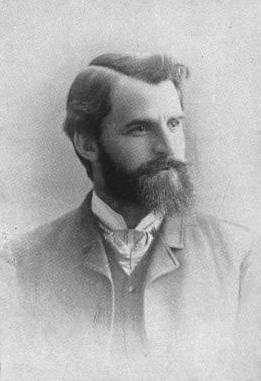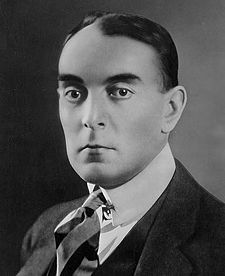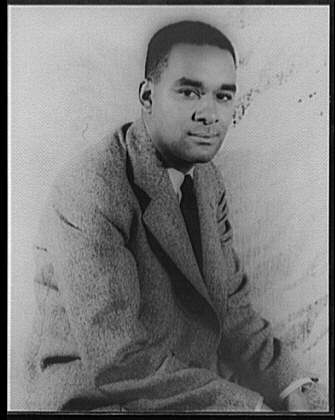
Danielle Allen
Born: 1971
Pen Name: None Connection to Illinois: Allen has lived and taught in Chicago. She joined the faculty at the University of Chicago in 1997 as Assistant Professor of Classics. In 2000, Dr. Allen became Associate Professor of Classical Languages and Literatures, Political Science and the Committee on Social Thought. In 2003, she was promoted to Professor. The following year she was named Dean of the Division of Humanities, a role she was in until 2007. Biography: Danielle Allen, James Bryant Conant University Professor at Harvard University, and Director of Harvard’s Edmond J. Safra Center for Ethics, is a political theorist who has published broadly in democratic theory, political sociology, and the history of political thought. Widely known for her work on justice and citizenship in both ancient Athens and modern America, Allen is a former Chair of the Mellon Foundation Board, past Chair of the Pulitzer Prize Board, and a member of the American Academy of Arts and Sciences and the American Philosophical Society. Allen is also the principal investigator for the Democratic Knowledge Project. She was a recipient of a MacArthur fellowship in 2001 and was elected to the American Academy of Arts and Sciences in 2009. In 2020, she won the Kluge Prize for Achievement in the Study of Humanity, administered by the Library of Congress, that recognizes work in disciplines not covered by the Nobel Prizes.
Awards:
- Our Declaration - Francis Parkman Prize, 2015; Chicago Tribune Heartland Award for nonfiction, 2015
Web: http://www.sss.ias.edu/faculty/allen
Selected Titles
 |
Cuz : ISBN: 9781432847760 OCLC: The author relates how her cousin was imprisoned at the age of fifteen for attempted carjacking and how she took him in upon his release, only to lose him to the deadly streets of South Central L.A. |
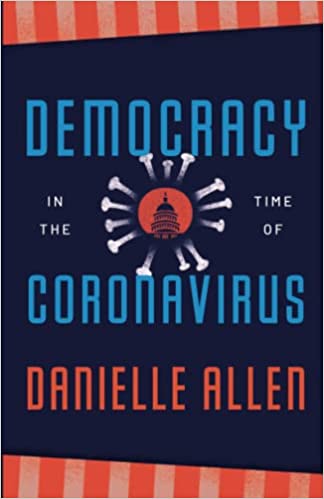 |
Democracy in the Time of Coronavirus ISBN: 0226815625 OCLC: University of Chicago Press 2021 Due to the COVID 19 pandemic, over 400,000 Americans have died in under a year, millions have lost their jobs, and industries have been devastated by the need to shut down much of society. Much of this could have been avoided if the US government had been prepared to undertake early uniform and comprehensive policies to hinder and stop the spread of the disease. In Democracy in the Time of Coronavirus, Danielle Allen looks at the US government's response to the COVID pandemic and offers a plan to create a stronger society and polity, one that can respond to the present pandemic and other crises while strengthening democracy and preserving the economy. She identifies the challenges faced by democracies particularly in times that require strong government action. Allen reminds us that survival of the democracy requires effective government action and honest and full exchange of information among citizens and with the government. It requires informed decision making that involves all citizens and offers equal treatment to all who are part of a country. In the end a better response can come from a democracy than an authoritarian system if we pay attention to the necessary foundations of democracy in the free exchange of information, respect for the rights of all to participate and benefit from effective government, and institutions that have the respect and loyalty of all -- |
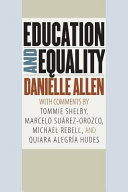 |
Education and equality ISBN: 022656634X OCLC: American education as we know it today - guaranteed by the state to serve every child in the country - is still less than a hundred years old. It's no wonder we haven't yet agreed exactly what role education should play in our society. In these Tanner Lectures, Danielle Allen brings us much closer, examining the ideological impasse between vocational and humanistic approaches that has plagued educational discourse and offering a compelling proposal to finally resolve the dispute -- |
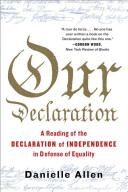 |
Our Declaration : ISBN: 9781631490446 OCLC: Allen makes the case that we cannot have freedom as individuals without equality among us as a people. Evoking the colonial world between 1774 and 1777, Allen describes the challenges faced by John Adams, Thomas Jefferson, Benjamin Franklin, Roger Sherman, and Robert Livingston--the Committee of Five who had to write a document that reflected the aspirations of a restive population and forge an unprecedented social contract. Although the focus is usually on Jefferson, Allen restores credit not only to John Adams and Richard Henry Lee but also to clerk Timothy Matlack and printer Mary Katherine Goddard. Allen also restores the text of the Declaration itself. Its list of self-evident truths does not end with our individual right to the pursuit of happiness but with the collective right of the people to reform government so that it will effect their Safety and Happiness. The sentence laying out the self-evident truths leads us from the individual to the community--from our individual rights to what we can achieve only together, as a community constituted by bonds of equality. |
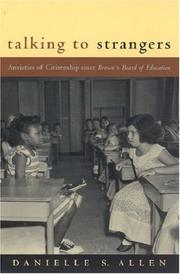 |
Talking to strangers : ISBN: 0226014673 OCLC: Chicago, Ill. : University of Chicago Press ; Chicago, Ill. : 2006. 'Don't talk to strangers' is the advice parents of all classes and races give to their children. Today that advice has evolved into a fundamental precept of civic education, reflecting interracial distrust, personal and political alienation, and a profound distrust of others. Danielle S. Allen takes this maxim back to Little Rock, rooting out the seeds of distrust to replace them with a citizenship of political friendship. Returning to the landmark Brown v. Board of Education decision, Allen argues that we have yet to complete the transition to political friendship that this moment offered. By combining brief readings of philosophers and political theorists with personal reflections on race politics in Chicago, Allen proposes strikingly practical techniques of citizenship--tools that can help us become more trustworthy to others and overcome the fossilized distrust among us. According to Allen, the key concept that bridges citizenship and trust is sacrifice. She uncovers the ordinary, daily sacrifices citizens make to keep democracy working--and offers methods for recognizing and reciprocating those sacrifices. --Page 4 of cover. |
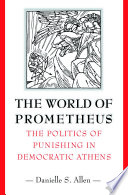 |
The World of Prometheus : ISBN: 1400824656 OCLC: Princeton : Princeton University Press, Princeton : Jan. 2009. For Danielle Allen, punishment is more a window onto democratic Athens' fundamental values than simply a set of official practices. From imprisonment to stoning to refusal of burial, instances of punishment in ancient Athens fueled conversations among ordinary citizens and political and literary figures about the nature of justice. Re-creating in vivid detail the cultural context of this conversation, Allen shows that punishment gave the community an opportunity to establish a shining myth of harmony and cleanliness: that the city could be purified of anger and social struggle, and perfect order achieved. Each member of the city--including notably women and slaves--had a specific role to play in restoring equilibrium among punisher, punished, and society. The common view is that democratic legal processes moved away from the emotional and personal to the rational and civic, but Allen shows that anger, honor, reciprocity, spectacle, and social memory constantly prevailed in Athenian law and politics. Allen draws upon oratory, tragedy, and philosophy to present the lively intellectual climate in which punishment was incurred, debated, and inflicted by Athenians. Broad in scope, this book is one of the first to offer both a full account of punishment in antiquity and an examination of the political stakes of democratic punishment. It will engage classicists, political theorists, legal historians, and anyone wishing to learn more about the relations between institutions and culture, normative ideas and daily events, punishment and democracy. |
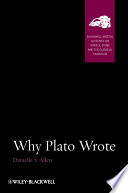 |
Why Plato wrote / ISBN: 1444334484 OCLC: Malden, MA : Wiley-Blackwell, Malden, MA : 2010. Why Plato Wrote is the first book to be published in the prestigious Blackwell Bristol Lecture Series in Greece, Rome and the Classical Tradition. In this thought-provoking text Danielle Allen eloquently argues that Plato wrote to change Athenian culture and thereby transform Athenian politics. She makes the case that Plato was not only the world's first systematic political philosopher, but also the western world's first think-tank activist and message man. Allen contends that the roles of philosopher and message man were not mutually exclusive, and that Plato's pursuit of language as a vehicle for affecting cultural norms was grounded in his philosophy of language. Why Plato Wrote is a lucid and engaging commentary on Plato's philosophy of language and its relation to his political theory -- |


